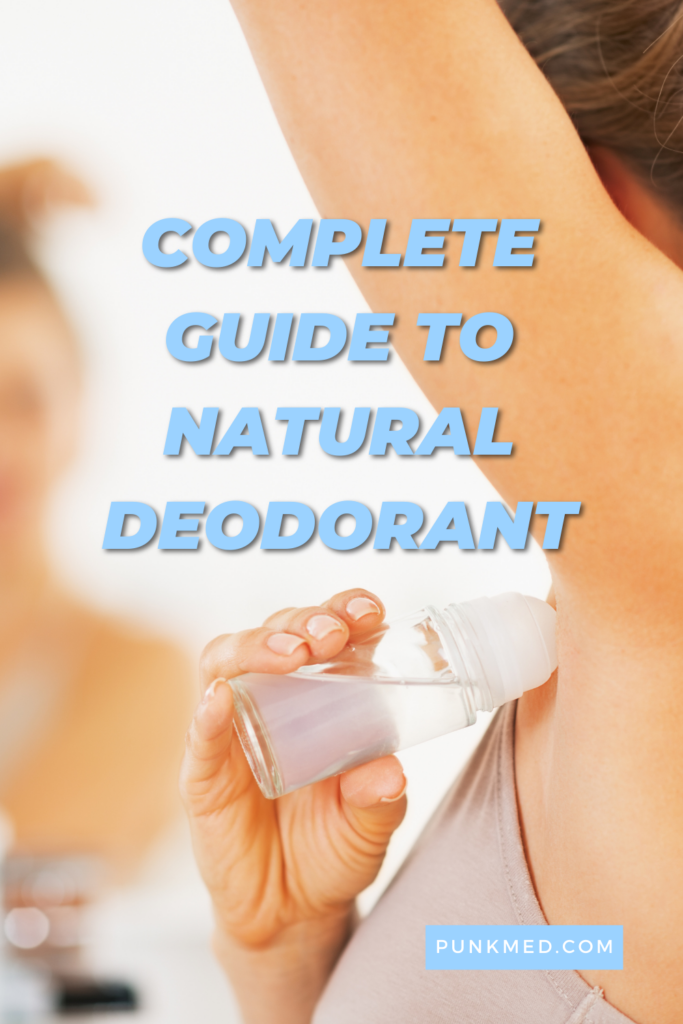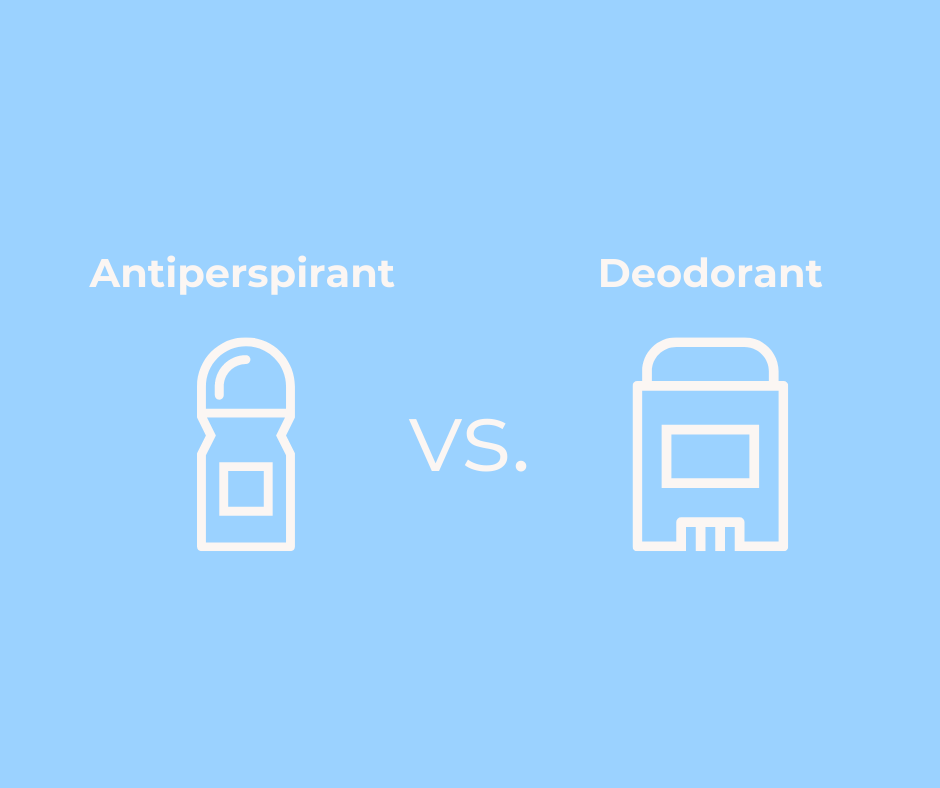This post may contain affiliate links, which means that I may receive a commission if you make a purchase using these links.
Unless you’ve been living under a rock, you’ve probably heard about ‘natural deodorant.’ The natural and clean beauty movement has put all of our daily products under a microscope (literally) and asked, “Is this actually slowly killing me?”
Maybe you’ve stuck to your traditional CVS antiperspirant. (I’ll take all the chemicals, thank youuuu!)
Maybe you’ve been using a natural deodorant for years, and you don’t quite know why other than you assume it is somehow better. (This is me until researching this article, to be honest.)
This article is for the natural deodorant-curious. I looked into the science behind the call for natural deodorant, and how natural deodorant affects the body compared to traditional antiperspirants.
We’ll cover what a deodorant is (compared to an antiperspirant), what natural deodorant means, why you might consider using a natural deodorant, and, importantly, does natural deodorant even work?
If you’re still interested in using a natural deodorant, I’ll give you my recommendations for the best natural deodorants in the last section.

Deodorant vs. Antiperspirant – Natural Deodorant Guide
First, some definitions. Deodorants and antiperspirants are actually two different products that work in entirely different ways.
An antiperspirant contains aluminum-based salts that physically block the sweat glands and prevent your armpits from producing sweat.
A deodorant will usually contain baking soda or some other ingredient to absorb moisture in addition to fragrance to mask odors. Deodorants allow your armpits to sweat as they normally would.


How Deodorants vs. Antiperspirants Work to Keep You Odor-Free
Why does this distinction between deodorants and antiperspirants matter?
The bacteria in your armpits are actually responsible for your stink. As bacteria metabolize nutrients in your sweat, they produce the compounds that we associate with body odor.
Antiperspirants prevent odor by reducing the moisture and nutrients the bacteria need.
Deodorants sop up some moisture, but mainly allow bacteria to go on living their best lives while masking odors with fragrance.
What Does Natural Deodorant Mean?
First of all, there is no official definition of a natural product. The term ‘natural’ is not overseen by any regulatory body in the United States.
Brands that use the term ‘natural’ to describe their deodorant are often first differentiating the product from an antiperspirant that uses aluminum. Instead, natural deodorants often use moisture wicking ingredients like baking soda or arrowroot powder.
Second, natural deodorants may be free from parabens and other chemicals that have at least the potential to affect human health.
Third, natural deodorants may be fragrance-free or use essential oils in lieu of artificial fragrances.
Why Use Natural Deodorant?
The demand for natural deodorants in the last few years seems to have arisen from two major concerns about traditional antiperspirants.
Natural Deodorant and the Skin Microbiome
First, there is concern around how antiperspirants may be affecting the skin microbiome of the armpit and how alterations in this delicate balance may affect your ability to fight off infection.
One 2016 study found that antispirant users had fewer colonies of culturable bacteria than deodorant users or people who don’t use any pit product.
The study also found Corynebacterium dominated the pits of non-product users, while the majority of bacteria found in both antiperspirant and deodorant users were Staphylococcaceae.
This could be a significant distinction, as Corynebacterium are the mostly harmless bacteria that produce odors, but members of the Staphylococcaceae family can be associated with infection. (The study points out that the armpit is a common site of MRSA infection in athletes).
Interestingly, the study also found that after ceasing product use, the microbial diversity of the armpits of antiperspirant users grew to be actually higher than deodorant users and people who don’t use any product.
The authors speculate that antiperspirants may make the armpits more hospitable to bacteria that are not historically found in that area. Whether that is a good, bad or neither is still unknown.
Still, any conclusions from this study are still speculative, and more research is needed to determine the significance of the variability between those that use antiperspirants compared to deodorants or no products at all.
In summary, whether natural deodorants are actually better for your skin microbiome is still unknown. Science is working on it!
Deodorants and Breast Health – Natural Deodorant Guide
The effect traditional antiperspirants and deodorants may have on breast health has been another cause for concern driving the demand for natural deodorant.
Rumors dating back to the ‘90s have stated that blocking the sweat glands with antiperspirants could hinder the bodies to eliminate toxins, and therefore increase risk of breast cancer.
The potential estrogenic effect of aluminum in antiperspirants and parabens in traditional cosmetic products (including deodorants) has also caused a lot of speculation.
Luckily, a 2013 review of the available literature on antiperspirant and breast cancer has shown the link to be dubious at best, with one study actually demonstrating deodorants as having a protective effect.
Does Natural Deodorant Work?
Now time for the most important question–will natural deodorant actually keep me from smelling?
It does seem like both antiperspirants and deodorants maintain lower levels of the bacteria that produce odor through different mechanisms.
However, deodorants make your armpits more friendly to bacteria overall. This could be a bonus to some people concerned about their microbiome.
Antiperspirants of course have the added benefit of blocking sweat and keeping your underarms dry, thus also making your pits more inhospitable to stinky bacteria.
It all has to do with your personal preference, what you think smells good, and your interpretation of the available science.
At the very least, your armpits are an exciting area of research.
Best Natural Deodorants
These are some of my tried-and-test favorite natural deodorants.

Lavanila – The Healthy Deodorant in Vanilla Lavender
This natural deodorant is seriously witchcraft. The Lavanila brand is known for their fragrances and they bring that expertise to their natural deodorant. This cult classic has won many beauty awards for its floral-vanilla scent that is not cloying or overly-sweet.

Schmidt’s – Natural Deodorant in Rose & Vanilla
Schmidt’s has really taken over the natural deodorant game. Any of their many scents will be a winner and keep your pits smelling fresh, but I particularly recommend the rose and vanilla.

Native – Natural Deodorant in Cucumber & Mint
Native has long been lauded in the beauty community as the only natural deodorant that actually works. I don’t know if they’re the only ones (see above) but their natural deodorant is definitely effective. Try the subtle cucumber and mint scent.
